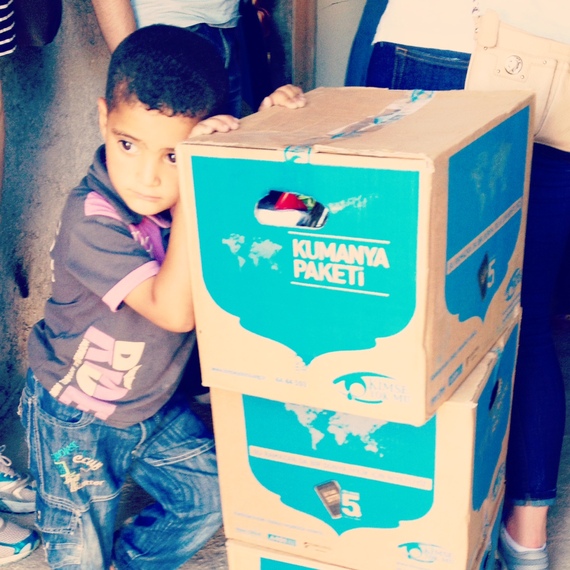As of June 2014, there are approximately 1 million Syrian refugees living in Turkey. Turkey, which is smaller in size than the state of Texas, shares a long border with Syria, much like Texas shares with Mexico.
In Syria, not just one generation, but many generations have been wiped out by the violence. People are starving, facing death, and they feel that they must escape the terror. Millions of people have fled Syria and while these refugees may be safe from President Bashar al-Assad's regime, which continues to drop barrels of bombs on civilians, now they face a new challenge: create a new life in a new country.
When the refugees first began to pour into Turkey's borders four years ago as the Syrian crisis began, Turkey set up government guest camps with sturdy housing, clean sidewalks and even satellite TV access. However, these camps could only house between 200,000 and 300,000 people. With the potential for thousands more refugees to arrive in Turkey in the next year, there are a lot of concerns about what to do with this new population of people that will likely never return to Syria.
Turkey never expected to deal with a refugee population this large. But now that Turkey has such a huge number of displaced people in its country, it will need to work hard to decide not only how to classify them, but also work on human securitization to educate, employ, house, and integrate the Syrian population, most of which do not speak Turkish, but rather Arabic.
During a recent media diplomacy trip to Turkey, I visited Kilis, which is a border town next to Syria. Kilis is approximately 120 kilometers from Aleppo, one of the largest cities in Syria. Kilis, which had been a small town of 90,000 until the thousands of Syrian refugees showed up, has been a challenging place for many refugees to find jobs.
The refugees are labeled as "guests" in Turkey, which means that they can't always work for pay even if they are highly skilled doctors, teachers and nurses. But given the need for these skills in these border towns, many are volunteering to educate Syrian kids and provide much needed medical assistance.
We traveled with a Turkish nonprofit working on the ground named Kimse Yok Mu to drop off boxes of food to several families living in makeshift tents and brick homes. This experience allowed us to get an inside view of the poverty that exists outside of the government camps: people without a country, without a stable home and who do not fit in anywhere in the Turkish system.
Ola, our Arabic translator, was a fellow refugee who happened to be an English teacher. She too had fled Syria, but because of her English skills she was able to get some paid work. Her priority she said was to teach Syrians English as it was the surest way to get employed.
Approximately 300 Syrian refugees come into Kilis on a daily basis. On the day of our visit, we saw a steady stream of women, children and men carrying suitcases across the border. Women in burqas traveled with suitcases above their heads under the heat of the summer sun until they could find a cab to take them to a new life and a new world.
We visited a nearby health clinic and met a man who had been shot while fighting Assad and was now paralyzed from the waist down. We also met a young boy, age 13, with a painted Free Syria flag on his arm, who had lost a foot after a bomb dropped on his house.
Toward the end of our day in Kilis, we made a final stop at the Kimse Yok Mu food distribution center where over 4,000 refugees came each day to get food. We put on bright orange volunteer jerseys to serve cooked bulgur wheat, pickled vegetable soup and bread.
After we finished serving, a group of women in burqas ran up to us. They began to yell at us in Arabic. I grabbed our translator, the indefatigable Ola, and asked her to help us understand.
The women want our help, she said.
They just got to Turkey yesterday from Syria.
They are angry. They want to know what is going to happen and who is going to fix this life they have suddenly been given.
We couldn't communicate with the women given we didn't know Arabic and they didn't know English. All we could do was try to show them that we cared and that we understood this was difficult and that we would try to share their stories with the world. If only we could tell them that the United States has given millions of dollars in aid to support Turkey and help the Syrians, perhaps they would have looked at us differently.
This is not supposed to be how anyone should have to live. And unfortunately, for the Syrian refugees, they are only at the beginning of a long, difficult journey.
For now, all we can do is to be a witness and ask the international community to recognize this crisis and support these refugees with aid, with jobs and with a promise of future stability.
---
This essay is the outcome of a media diplomacy trip sponsored by The RUMI Forum and Truman National Security Project.
